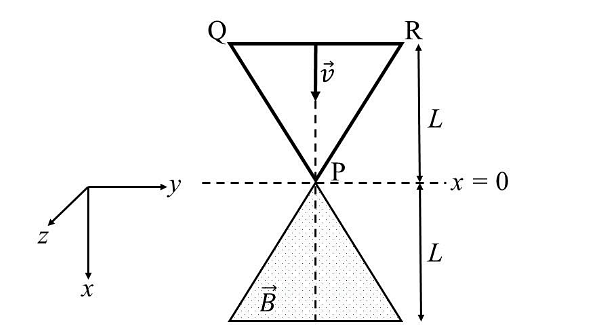Question:
Given positive integers $r >1, n > 2$ and the coefficient of $(3r)th$ and $ (r + 2)th $ terms in the binomial expansion of $(1 + x)^2n$ are equal. Then,
Given positive integers $r >1, n > 2$ and the coefficient of $(3r)th$ and $ (r + 2)th $ terms in the binomial expansion of $(1 + x)^2n$ are equal. Then,
Updated On: Jun 14, 2022
- n=2r
- n=2r+1
- n=3r
- None of these
Hide Solution
Verified By Collegedunia
The Correct Option is A
Solution and Explanation
In the expansion $(1+x)^{2n},t_{3r} = \, ^{2n}C_{3r-1} (x)^{3r-1}$
and $\hspace20mm \, t_{r+2}= \, ^{2n}C_{r+1} (x) ^{r+1}$
Since, binomial coefficients of t$_3r$ and t$_{r+ 2}$ are equal
$\Rightarrow \, \, \, \, \, \, \, \, 3r-1=r+1 \, or \, 2n=(3r-1)+(r+1)$
$\Rightarrow \, \, \, \, \, \, \, \, $ 2r=2 $ \, or \, \, \, \, \, \, \, \, $ 2n = 4r
$\Rightarrow \, \, \, \, \, \, \, \, $ r = 1 $ \, or \, \, \, \, \, \, \, \, $ n=2r
But $ \, \, \, \, \, \, \, \, $ r >1
$\therefore \, \, $We take, n=2r
and $\hspace20mm \, t_{r+2}= \, ^{2n}C_{r+1} (x) ^{r+1}$
Since, binomial coefficients of t$_3r$ and t$_{r+ 2}$ are equal
$\Rightarrow \, \, \, \, \, \, \, \, 3r-1=r+1 \, or \, 2n=(3r-1)+(r+1)$
$\Rightarrow \, \, \, \, \, \, \, \, $ 2r=2 $ \, or \, \, \, \, \, \, \, \, $ 2n = 4r
$\Rightarrow \, \, \, \, \, \, \, \, $ r = 1 $ \, or \, \, \, \, \, \, \, \, $ n=2r
But $ \, \, \, \, \, \, \, \, $ r >1
$\therefore \, \, $We take, n=2r
Was this answer helpful?
0
0
Top Questions on Binomial theorem
- \(\frac {C_1^{11}}{2}+\frac {C_2^{11}}{3}+.....+\frac {C_9^{11}}{10}=\frac mn\). Then \(m+n\) is
- JEE Main - 2024
- Mathematics
- Binomial theorem
- If n is even and the middle term in the expansion of \((x^2+\frac{1}{x})^n\) is 924 x6, then n is equal to
- KCET - 2023
- Mathematics
- Binomial theorem
- If the coefficients of \((5r+4)th\) term and \((r-1)th\) term in the expansion of \((1+x)^{25}\) are equal, then \(r\) is
- KEAM - 2023
- Mathematics
- Binomial theorem
- The remainder, when $19^{200}+23^{200}$ is divided by $49$ , is_______
- JEE Main - 2023
- Mathematics
- Binomial theorem
- Let a and b be two nonzero real numbers. If the coefficient of x5 in the expansion of (\(ax^2+(\frac{70}{27bx})^4\) is equal to the coefficient of x-5 in the expansion of \((ax-\frac{1}{bx^2})^7\). then the value of 2b is
- JEE Advanced - 2023
- Mathematics
- Binomial theorem
View More Questions
Questions Asked in JEE Advanced exam
- A region in the form of an equilateral triangle (in x-y plane) of height L has a uniform magnetic field 𝐵⃗ pointing in the +z-direction. A conducting loop PQR, in the form of an equilateral triangle of the same height 𝐿, is placed in the x-y plane with its vertex P at x = 0 in the orientation shown in the figure. At 𝑡 = 0, the loop starts entering the region of the magnetic field with a uniform velocity 𝑣 along the +x-direction. The plane of the loop and its orientation remain unchanged throughout its motion.

Which of the following graph best depicts the variation of the induced emf (E) in the loop as a function of the distance (𝑥) starting from 𝑥 = 0? - Two beads, each with charge q and mass m, are on a horizontal, frictionless, non-conducting, circular hoop of radius R. One of the beads is glued to the hoop at some point, while the other one performs small oscillations about its equilibrium position along the hoop. The square of the angular frequency of the small oscillations is given by [ \(\epsilon_0 \)is the permittivity of free space.]
- JEE Advanced - 2024
- Moving charges and magnetism
- A group of 9 students, s1, s2,…., s9, is to be divided to form three teams X, Y and Z of sizes 2, 3, and 4, respectively. Suppose that s1 cannot be selected for the team X and s2 cannot be selected for the team Y. Then the number of ways to form such teams, is _______.
- JEE Advanced - 2024
- Combinations
- Let \(\vec{p}=2\hat{i}+\hat{j}+3\hat{k}\) and \(\vec{q}=\hat{i}-\hat{j}+\hat{k}\). If for some real numbers α, β and γ we have
\(15\hat{i}+10\hat{j}+6\hat{k}=α(2\vec{p}+\vec{q})+β(\vec{p}-2\vec{q})+γ(\vec{p}\times\vec{q})\),
then the value of γ is ________.- JEE Advanced - 2024
- Vector Algebra
- Let X be a random variable, and let P(X = x) denote the probability that X takes the value x. Suppose that the points (x, P(X = x)), x = 0,1,2,3,4, lie on a fixed straight line in the xy -plane, and P(X = x) = 0 for all x ∈ R - {0,1,2,3,4}. If the mean of X is \(\frac{5}{2}\) , and the variance of X is α, then the value of 24α is ______.
- JEE Advanced - 2024
- Probability
View More Questions
Concepts Used:
Binomial Theorem
The binomial theorem formula is used in the expansion of any power of a binomial in the form of a series. The binomial theorem formula is

Properties of Binomial Theorem
- The number of coefficients in the binomial expansion of (x + y)n is equal to (n + 1).
- There are (n+1) terms in the expansion of (x+y)n.
- The first and the last terms are xn and yn respectively.
- From the beginning of the expansion, the powers of x, decrease from n up to 0, and the powers of a, increase from 0 up to n.
- The binomial coefficients in the expansion are arranged in an array, which is called Pascal's triangle. This pattern developed is summed up by the binomial theorem formula.



